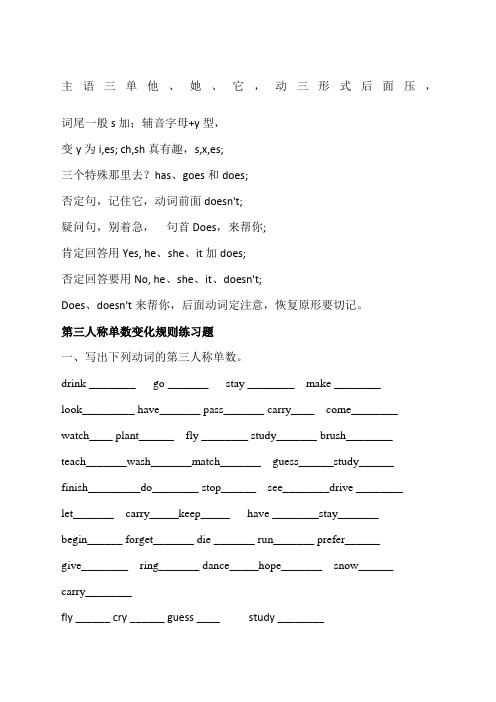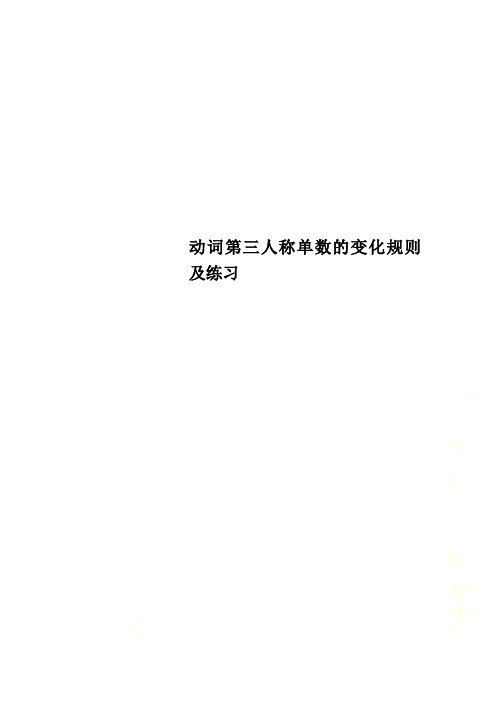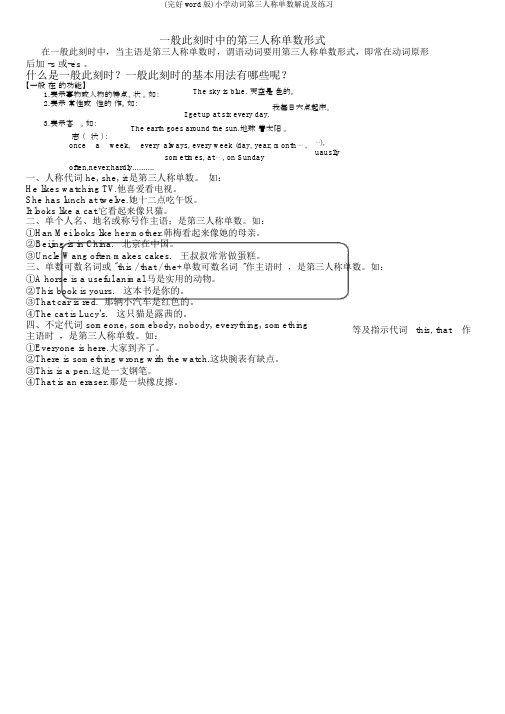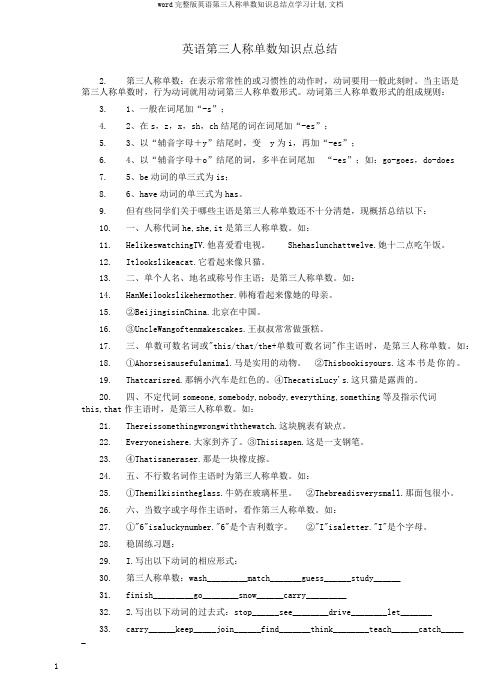完整word版小学动词第三人称单数讲解及练习
小学三单讲解与练习

主语三单他、她、它,动三形式后面压,词尾一般s加;辅音字母+y型,变y为i,es; ch,sh真有趣,s,x,es;三个特殊那里去?has、goes和does;否定句,记住它,动词前面doesn't;疑问句,别着急,句首Does,来帮你;肯定回答用Yes, he、she、it加does;否定回答要用No, he、she、it、doesn't;Does、doesn't来帮你,后面动词定注意,恢复原形要切记。
第三人称单数变化规则练习题一、写出下列动词的第三人称单数。
drink ________ go _______ stay ________ make ________look_________ have_______ pass_______ carry____ come________ watch____ plant______ fly ________ study_______ brush________teach_______wash_______match_______ guess______study______finish_________do________ stop______ see________drive ________let_______ carry_____keep_____ have ________stay_______begin______ forget_______ die _______ run_______ prefer______give________ ring_______ dance_____hope_______ snow______carry________fly ______ cry ______ guess ____ study ________二、用正确的形式填空1.I ____ (have) a cat.2.He ____ (have) a dog.3.She ____ (have) long hair.4.We ____ (have) a big house.5.They ____ (have) a happy family.6.It ____ (have) a short tail.7.You ____ (have) a good teacher.8.Elva ____ (have) two big eyes.9.Tom ____ (have) a red pen.10.My mother ____ (have) a beautiful nose.11.Cats ____ (have) four legs. 12.Dogs ____ (have) two ears.13.My father ____ (have) a blue car.14.Everybody ____ (have) two hands.15.I ____ (have) a model plane. 16.Lily ____ (have) a doll.17.Students ____ (have) many books.18.Girls ____ (have) many skirts.19.The baby ____ (have) no teeth.20.They ____ (have) some fish用do或者dose填空1.I ____ have a cat.2.He ____ like dogs..3.She ____ have a long hair.4.We ____ have a big house.5.They ____ have a happy family.6.It ____ have a short tail.7.You ____ like a good teacher. 8.Elva ____ like a bad girl.9.Tom ____ have a red pen. 10.My mother ____ have a beautiful nose.11.Cats ____ have two legs. 12.Dogs ____ have one ears.13.My father ____ have a blue car. 14.Everybody ____ have two hands.15.I ____like a model plane. 16.Lily ____ like a toy.。
完整版)小学动词第三人称单数讲解及练习

完整版)小学动词第三人称单数讲解及练习一般现在时是指在现在发生的动作或状态。
它有三个基本用法:1.描述事物或人的特征和状态,例如“天空是蓝色的”。
2.表示经常性或惯性的动作,例如“我每天六点起床”。
3.描述客观现实,例如“地球绕着太阳转”。
在一般现在时中,当主语是第三人称单数时,谓语动词要用第三人称单数形式,即常在动词原形后加-s或-es。
常见的时间状语有always,every week (day。
year。
month…),once a week,every…,sometimes,at…,on Sunday,usually,often,never,hardly等。
主语可以是人称代词he。
she。
it,单个人名、地名或称呼,单数可数名词或“this / that / the+单数可数名词”,以及不定代词someone。
somebody。
nobody。
everything。
something等及指示代词this。
that。
例如,“他喜欢看电视”、“XXX看起来像她的母亲”、“马是有用的动物”、“这本书是你的”、“这只猫是XXX的”、“大家到齐了”、“这块手表有毛病”、“这是一支钢笔”。
④This is an eraser.XXX is used as the subject。
it takes the third person singular form。
For example:①The milk is in the glass.②The bread is very small.When a number or letter is used as the subject。
it is treated as third person XXX:①"6" XXX.②"I" XXX.The rule for adding -s or -es to verbs in the third person singular form is as follows:1.In general。
动词第三人称单数的变化规则及练习

动词第三人称单数的变化规则及练习动词第三人称单数的变化规则及练习一、变化规则1、直接在动词后+s例如:like- likes play-plays 2、以s, x, sh, ch, 接尾的动词:+es例如:wash-washes3、以辅音+o接尾的动词:+es例如:go-goes4、以辅音+y接尾的动词:变y为i+es例如:fly-flies动词短语:+s: Plays, skips, sings, gives, starts, likes,buys some toys, gets up comes back homemakes noodles, eats lunch drinks coffeebegins his class , practices the piano+es : watches TV brushes his teethgoes to bed goes to schooldoes my homework does some readingy→ i+ es: fly → flies study →studies注意:不规则变化:have-----has,be-------is,do-----does写出下列动词的第三人称单数drink ________ go _______ stay ________ make ________look_________ have_______ pass_______ carry_____come________ watch______plant_______ fly ________study_______brush________do_________ teach_______practice_______否定回答。
1.I usually get up at six o’clock.Do you usually get up at six ?Yes, I do . /No, I don’t .2. We usually write e-mails on Saturday evening?Yes, No,3. They have the same hobby.?Yes, No,4. Su Hai and Su yang like listening to music after school.?Yes, No,5. Helen usually watches TV in the evening.?Yes, No,二、否定句:在动词前+doesn't或don't.1. She_____ _____(do)her homework everyday.2. He_____ _____(live)in Huanggang.3. The girl_____ _____(look)out of the window and sees many birds in the sky.4. Jenny runs home and_____ _____(sit)on the chair.三、一般疑问句:1._____the desk_____(have)four legs? Yes, it does.2._____she____(do)her homework every day?Yes, she does.3._____he_____(live)in Huanggang? No, he doesn't.4. Does Danny_____(see)the apple tree?四、按照要求改写句子:1. I do my homework every day.(改为一般疑问句,作否定回答)_____________________________________ ___________________2. She likes milk.(改为一般疑问句,作肯定回答)_____________________________________ _______________________3. Amy likes playing computer games.(改为一般疑问句,作否定回答)_____________________________________ ______________4. We go to school every morning.(改为否定句)_____________________________________ __________________5. I like taking photos in the park.(对划线部分提问)_____________________________________ ___________________6. John comes from Canada.(对划线部分提问)_____________________________________ ______________7. Simon and Daniel like going skating.(改为否定句)_____________________________________ ______________五、改错(划出错误的地方,将正确的写在横线上)1. Is your brother speak English? __________________2. Does he likes going fishing? __________________3. He likes play games after class. __________________4. Mr. Wu teaches our English. __________________5. She doesn’t does her homework on Sundays. _________________课堂练习二一、写出所给词的第三人称单数形式sit swim read make run write have go do watch cry study play say wash二、用do或does的适当形式填空1. _____ you ride a bike to school? Yes, I________.2. ______ your sister like PE? No, she ________.3. What_______ the students have? They have some pens.4. How_______ Linda go to school? She goes to school on foot.5. He _______ not speak English. He speaks Chinese.6. _______ they watch TV on Sundays? Yes, they _______.7. My father and mother ______ not read newspapers on Saturday.三、句型转换1. I go to school by bus. (用He做主语变否定句)_____________________________________ ___2. Kim plays baseball very well. (变一般疑问句)_____________________________________ ___3. David doesn’t like learning French. (变肯定句)_____________________________________ ___4. Alan doesn’t watch TV on school nights. (变肯定句)_____________________________________ ___5. We have enough time to do it. (变否定句)_____________________________________ ___6. Snoopy has a car. (对划线部分提问)____________________________________________ __________________7. Do you have a pencil? (把主语改成she)______________________________________________ __________________四、动词的适当形式填空Jim’s father(work) in a bank. He (go) to work by bus every morning, sometimes he (ride) his bike.But he (be) never late for work. He (work) very hard.Jim (like) his father very much. They often (play)badminton(羽毛球)in front of their house, sometimes they (play) table tennis in Jim’s school.Jim (like) to talk with his father. His father (like) to hear Jim talking about his friends and his school. On Saturday or Sunday, they often (play) on the computer. Jim (have) many computer games. But he doesn’t (play) them every day. He also (work) hardat his lessons.。
(完整word版)小学动词第三人称单数讲解及练习

一般此刻时中的第三人称单数形式在一般此刻时中,当主语是第三人称单数时,谓语动词要用第三人称单数形式,即常在动词原形后加 -s 或-es 。
什么是一般此刻时?一般此刻时的基本用法有哪些呢?【一般在的功能】1.表示事物或人物的特点、状。
如:The sky is blue. 天空是色的。
2.表示常性或性的作。
如:I get up at six every day.我每日六点起床。
3.表示客。
如:The earth goes around the sun.地球着太阳。
志(状):once a week, every always, every week (day, year, month ⋯ ,sometimes, at ⋯ , on Sunday ⋯), uausllyoften,never,hardly..........一、人称代词 he, she, it是第三人称单数。
如:He likes watching TV.他喜爱看电视。
She has lunch at twelve.她十二点吃午饭。
It looks like a cat.它看起来像只猫。
二、单个人名、地名或称号作主语;是第三人称单数。
如:①Han Mei looks like her mother.韩梅看起来像她的母亲。
②B eijing is in China. 北京在中国。
③U ncle Wang often makes cakes. 王叔叔常常做蛋糕。
三、单数可数名词或 "this / that / the+单数可数名词"作主语时,是第三人称单数。
如:①A horse is a useful animal.马是实用的动物。
②T his book is yours. 这本书是你的。
③That car is red. 那辆小汽车是红色的。
④The cat is Lucy's. 这只猫是露茜的。
四、不定代词 someone, somebody, nobody, everything, something主语时,是第三人称单数。
动词第三人称单数的变化规则讲解及习题练习(附答案)

动词第三人称单数的变化规则讲解及习题练习(附答案)1. 大部分单词可以直接在动词后: +s例:like -- like splay -- play swork--work sread--read swrite--write s发音规则:所加的“s”在清辅音后,发【s】,works在浊辅音及元音后,发【z】,plays在d 后与s 一起发【dz】,reads在t 后与s 一起发【ts】,writes2. 以s, x, sh, ch, 结尾的动词: +es例:watch -- watch esbrush-- brush eswash--wash es发音规则:词尾加的“es”,发【iz】3. 以辅音+o 结尾的动词: +es例:go -- go esdo -- do es发音规则:词尾加的“es”,发【z】,does4. 以辅音+y 结尾的动词: 变y 为i+es例:fly -- fl iesstudy -- stud iescarry--carr ies发音规则:词尾加的“es”,发【iz】,carries5. 不规则变化:例:have -- hasbe 动词的单三形式是:is练习题1. 写出下列动词第三人称单数。
drink ________ go _______stay ________ make _______look ________have_______pass_______ carry ________come_______ watch______plan_______ fly ________study_______ brush________do_________ teach_______2. 用所给单词的适当形式填空。
(1) He ______ (go) to school by bus every morning.(2) Jim _______ (have) many toys.(3) Lucy ______ (study) very hard.She ______ (be) never late for school.(4) Ken _______ (like) his father very much.答案:1.drinks goes stays makes looks has passes carries comes watches plans flies studies brushes does teaches2. (1) goes (2) has (3) studies is (4) likes。
(完整版)动词单三变化规律及练习题(五年级)

动词第三人称单数词尾变化及读音动词第三人称单数词尾变化有三种形式。
(1)一般动词在词尾加 -s,-s 在清辅音后读/ s/,在浊辅音或元音后读/ z/ds 读/ dz/, ts 读/ ts/。
如:help→helps/helps/, know→knows/n uz/, get→gets/gets/,read→reads/ri dz/(2)以字母 s,x,ch,sh 或有些以 o 结尾的动词加 -es,-es 读/ iz/。
如:guess→guesses/'siz/, fix →fixes/ 'fiksiz /, teach→ teaches/'ti t iz/, wash→washes/'w iz/注意: go→goes/uz/, do→does/d z/(3)以辅音字母 +y 结尾的动词,先变y 为 i ,再加 -es,-ies 读/ iz/。
如:carry→carries/'k riz/, fly → flies/flaiz /注:在 play→plays/pleiz/, say→says/sez/中,字母 y 前为元音字母,第三人称单数形式直接在动词后边加-s。
(4)特别词例外。
如:be→is,have→has以不发音字母“ e”结尾的开音节词,假如尾音是 [s],[z] 时,加“ s”后字母“ e”发音,与所加“ s”,一同读做 [iz] 。
如:close-closes [iz]一般此刻时练习(一)一、用词的适合形式填空time_________ his father_________(do) the work?2.He _________(get) up at five o’ clock.3.__________ you _________(brush) your teeth every morning?4.What ________ ( do ) he usually ________( do ) after school?5.Tom ________ ( study ) English, Chinese, Maths, Science and Art at school.6. Kitty sometimes __________(go) to the park with his sister.7.At eight at night, she __________( watch ) TV with her parents.8. ________ Mike________( read ) English every day?9.How many lessons________ your classmates______( have ) on Monday?10.We often___________ ( play ) football in the playground.二、选择( ) 1. _____ you have a book?A. DoB. AreC. IsD. Have( )2. They _________ on a farm.A. workingB. is workC. workD. is worked( ) 3. Does Peter like to watch TV?__________.A. Yes, he likeB. No, he doesn’tC.Yes, he’ d likeD. No, he likes ( )4. She doesn’ t __________ her homework in the afternoon.A. doingB. to doC. doesD. do( )5. How ____________ Mr. Brown ___________ to America?A. do,goB. is,goC. does,goD. does,goes( )6. Where’ s my camera? I____________ it.A. am not findingB. am not seeingC. can ’ t findD. can ’ t look at ( )7. How ___________ he go to work?He ___________ to work by bike.A. does ;goB. do;goesC. do ;goD. does;goes( )8. ______ you usually late for school?No, _____________.A. Do ; I amB. Does ;notC. Are ; I ’ m notD. Are ; I aren ’t ( )9. _____ she _____ home at six every day?A. Is , leaveB. Does , leaveC. Is , leavesD. Does , left( )10. Mr. Yang ____________ English this term.A. teaches ourB. teaches usC. teachs usD. teach our一般此刻时练习(二)一、单项选择题1. Jenny ____ in an office. Her parents ____in a hospital.A. work worksB. works workC. work are workingD. is working work2. One of the boys_____ a black hat.A. haveB. there isC. there areD. has3. We will go shopping if it____ tomorrow.A. don't rainB. didn't rainC. doesn't rainD. isn't rain4. He said the sun ____in the east and ____in the west.A. rose; setB. rises; setsC. rises; setD. rise; sets5. Wang Mei ____ music and often ____ to music.A. like; listenB. likes; listensC. like; are listeningD. liking; listen6. Jenny____ English every evening.A. has studyB. studiesC. studyD. studied7. _____Mike from Japan?A. AreB. DoC. Does8. _____you come from Japan?A. AreB. DoC. Does9.What language do you_______?A. sayB. talkC. tellD. speak10.The elephant likes______her friends and _____grass.A. play with; eatB. play with; eatsC. to play with; eatD. to play with; eats二、所给动词的正确形式填空1.I can take Li Ming there when he _____(come) to visit.2._____your sister_____(know)English?3.Her home____ (be) away from her school.4.The pot_____(not look) like yours very much.5.Where _____you____(have)lunch every day?6.Who_____(want)to go swimming?7.______she_____(do) the housework every day?8.Jenny and Danny usually______(play) games in the afternoon .9.______you ______(like) English?10.What______his father_____(do) ?。
第三人称单数 超详细带练习题

• 含义: • 在一般现在时或进行时的情况下,当主语
是第三人称单数的时候,谓语动词要有所 改变,一般是加-s,也有特殊情况。 eg. She likes apples. • He is happy to attend the meeting. • Mary plans to swim this afternoon. • My mother asks me to help her.
buy food fly study come back home
________ food
________ _______
第三人称单数__超__详_细_带__练back home
习题
一.用所给单词的适当形式填空 1. I usually ____ (go) running for half an hour at the
第三人称单数 超详细带练 习题
do exercise
The rat
第三人称e单x数er超ci详s细e 带e练veryday. 习题
swim
swims
She
after school.
第三人称单数 超详细带练 习题
read
reads
He
books everyday.
第三人称单数 超详细带练 习题
play football
Nobody
in the classroom.
第三人称单数 超详细带练
习题
There something wrong with the watch.
这块手表有毛病。
第三人称单数 超详细带练 习题
六. 不可数名词作主语时为第三人称单数。
The milk
in the glass.
(完整版)动词第三人称单数的变化规则及练习.docx

动词第三人称单数的变化规则及练习一、变化规则1、直接在动词后 +s例如:like- likes play-plays2、以 s, x, sh, ch, 接尾的动词: +es例如:wash-washes3、以辅音 +o 接尾的动词: +es例如:go-goes4、以辅音 +y 接尾的动词:变y 为 i+es例如:fly-flies动词短语:+s:Plays, skips, sings, gives, starts, likes,buys some toys, gets up comes back homemakes noodles, eats lunch drinks coffeebegins his class , practises the piano+es :watches TV brushes his teethgoes to bed goes to schooldoes my homework does some readingy→ i+ es: fly→ flies study→ studies注意:不规则变化: have-----has,be-------is,do-----does写出下列动词的第三人称单数drink ________ go _______ stay ________ make ________look _________ have_______ pass_______ carry ____come________ watch______ plant_______ fly ________study_______ brush________ do_________ teach_______二、请看下面两组句子,注意区分他们的共同点和不同点。
I go to school every day.I don't go to school every day.He goes to school every day.He doesn't go to school every day.Do you go to school every day?Yes, I do. (No, I don't)Does he go to school every day?Yes, he does. (No, he doesn't)注:1)第三人称单数用了does 后面就不用动词的s 形式了 ,而用动词原形 .。
动词第三人称单数的变化规则及练习

动词第三人称单数的变化规则及练习一、使用情况:在一般现在时中,当主语是第三人称单数时,谓语动词要用第三人称单数形式,即常在动词原形后加-s或-es。
(标志词usually often always sometimes never every等)二、变化规则1、直接在动词后+s例如:like- likes play-plays2、以s, x, sh, ch, 接尾的动词:+es例如:wash-washes3、以辅音+o接尾的动词:+es例如:go-goes4、以辅音字母+y接尾的动词:变y为i+es例如:fly-flies以元音字母+y接尾的动词后+s例如:play-plays5、除上述规律外,还应注意下面三点:1)动词have ,遇到主语是第三人称单数时,要用has;动词be 的第三人称单数形式是is。
2)含有动词第三人称单数形式的句子变否定句时,要用doesn't + 动词原形,如:He goes to school at six in the morning. (变否定句)→He doesn't go to school at six in the morning.3)对含有动词第三人称单数形式的句子提问时,要用助动词does如:She goes home at five every day. (对划线部分提问)→When / What time does she go注意:不规则变化:have-----has,be-------is,do-----doesI 写出下列动词的第三人称单数(-s)和现在分词(-ing) godoplayjumpswimrunputsingdancecomegethaveflystudyreadwritelookdrinkeatwalklikeII选择1.Ben_____a new book.A. haveB. hasC. havesD. were2.Ben and Mary some books.A. haveB. hasC. areD. were3.I some stories every day.A. haveB. hasC. areD. were4.I __________ ice cream.A.likeB.likesC.likingD.likees5. Kitty__ English every dayA.readB.readesC.readingD.reads6.A man _____in front of his car.A.walkB.walksC.walkingD.work7.Sam’s bicycle ______a bell.A.have B has C.having D.is having8.I every dayA.swimB.swimsC.swimingD.swimes9.He his homework every day.A.doesB.doC.areD.is10. I ________ my homework every day.A.doB.isC.doesD.are11.They ________ their homework every day.A. doB.doesC. isD.are11.Lucy_______with her hands.A.touchB.touchingC.touchesD.touchs12.Superdog________the boysA.seeB.seesC.seeingD.ses13.Supergirl and Superdog______them.A.savesB.saveC.savingD.is saving14.Jack_______their cow.A.sellsB.sellC.sellingD.are selling15.Jack______up the beanstalk.A.getsB.getC.climbD.climbs16.The giant ______boys.A.eatingB.don’t eatC.eatsD.eat17.The goose_______golden eggs.yysyedyes17.The woman_______the beanstalk.A.cutB.cuttingC.are cutD.cuts18.Her mother ______the beanstalk.A.takeB.is take Ctakes D. taking19Jack andher mother _____happerA.doesB.areC.isD. have20.He____the beans in the ground.A.buyB.putsC.putD.buys二.填空:1.She ______(do) homework by herself.2.Jack ______(go) home by bike.3.The giant______(climb) up the beanstalk.4.Her mum ______(run) to the goose.5.He______(do not)like apple.6,Sam______(put) it under his arm.7.The boy_______(chase) it.8.Kitty______(watch)TV everyday.9.He______(feed)them at 8:00 in the morning.10.When ______(do)he get up?11.Grandma Wang___(live) in Pudong.12.The girls___(give) the key to Grandpa.13.That key ______(open) the old box.14.She ______(say) “I like these puppets”.15.What_____(do)Alice find?16.Which toy_____(do) she like?17.He doesn’t______(know)her name.18.John can’t_______(find) his watch.19.Where _____(do)Grandma live?20.How does he______(go)to the post office?三、请看下面两组句子,注意区分他们的共同点和不同点。
动词第三人称单数的变化规则及练习

动词第三人称单数的变化规那么及练习一、使用情况:在一般现在时中,当主语是第三人称单数时,谓语动词要用第三人称单数形式,即常在动词原形后加-s或-es。
(标志词usually often always sometimes never every等)二、变化规那么1、直接在动词后+s例如:like- likes play-plays2、以s, x, sh, ch, 接尾的动词:+es例如:wash-washes3、以辅音+o接尾的动词:+es例如:go-goes4、以辅音字母+y接尾的动词:变y为i+es例如:fly-flies以元音字母+y接尾的动词后+s例如:play-plays5、除上述规律外,还应注意下面三点:1)动词have ,遇到主语是第三人称单数时,要用has;动词be 的第三人称单数形式是is。
2〕含有动词第三人称单数形式的句子变否认句时,要用doesn't + 动词原形,如:He goes to school at six in the morning. (变否认句)→He doesn't go to school at six in the morning.3)对含有动词第三人称单数形式的句子提问时,要用助动词does如:She goes home at five every day. (对划线局部提问)→When / What time does she go注意:不规那么变化:have-----has,be-------is,do-----doesI 写出以下动词的第三人称单数(-s)和现在分词(-ing) godoplayjumpswimrunputsingdancecomegethaveflystudyreadwritelookdrinkeatwalklikeII选择1.Ben_____a new book.A. haveB. hasC. havesD. were2.Ben and Mary some books.A. haveB. hasC. areD. were3.I some stories every day.A. haveB. hasC. areD. were4.I __________ ice cream.5. Kitty__ English every day6.A man _____in front of his car.7.Sam’s bicycle ______a bell.A.have B has C.having D.is having8.I every day9.He his homework every day.10. I ________ my homework every day.11.They ________ their homework every day.11.Lucy_______with her hands.12.Superdog________the boys13.Supergirl and Superdog______them.A.savesB.saveC.savingD.is saving14.Jack_______their cow.A.sellsB.sellC.sellingD.are selling15.Jack______up the beanstalk.16.The giant ______boys.17.The goose_______golden eggs.17.The woman_______the beanstalk.18.Her mother ______the beanstalk.A.takeB.is take Ctakes D. taking19Jack andher mother _____happerA.doesB.areC.isD. have20.He____the beans in the ground.二.填空:1.She ______(do) homework by herself.2.Jack ______(go) home by bike.3.The giant______(climb) up the beanstalk.4.Her mum ______(run) to the goose.5.He______(do not)like apple.6,Sam______(put) it under his arm.7.The boy_______(chase) it.8.Kitty______(watch)TV everyday.9.He______(feed)them at 8:00 in the morning.10.When ______(do)he get up?11.Grandma Wang___(live) in Pudong.12.The girls___(give) the key to Grandpa.13.That key ______(open) the old box.14.She ______(say) “I like these puppets〞.15.What_____(do)Alice find?16.Which toy_____(do) she like?17.He doesn’t______(know)her name.18.John can’t_______(find) his watch.19.Where _____(do)Grandma live?20.How does he______(go)to the post office?三、请看下面两组句子,注意区分他们的共同点和不同点。
小学动词第三人称单数讲解及练习

在一般现在时中,当主语是第三人称单数时,谓语动词要用第三人称单数形式,即常在动词原形后加-s或-es。
什么是一般现在时?一般现在时的基本用法有哪些呢?【一般现在时的功能】1.表示事物或人物的特征、状态。
如:The sky is blue.天空是蓝色的。
2.表示经常性或习惯性的动作。
如:I get up at six every day.我每天六点起床。
3.表示客观现实。
如:The earth goes around the sun地球绕着太阳转。
u ; 、标志词(时间状语):always, every week (day, year, month …),once a week, every …,sometimes, at …,on Sun day uauslly often,never,hardlyV一、人称代词he, she, it是第三人称单数。
如:He likes watchi ng TV. 他喜欢看电视。
She has lunch at twelve. 她十二点吃午餐。
It looks like a cat. 它看起来像只猫。
二、单个人名、地名或称呼作主语;是第三人称单数。
如:①Han Mei looks like her mother. 韩梅看起来像她的母亲。
②Beiji ng is in Chi na. 北京在中国。
③Un cle Wang often makes cakes. 王叔叔经常做蛋糕。
三、单数可数名词或"this / that / the+ 单数可数名词"作主语时,是第三人称单数。
如:①A horse is a useful a nimal. 马是有用的动物。
②This book is yours. 这本书是你的。
③That car is red.那辆小汽车是红色的。
④The cat is Lucy's. 这只猫是露茜的。
四、不定代词some one, somebody, n obody, everythi ng, someth ing 主语等及指示代词this, that作时,是第三人称单数。
小学动词第三人称单数形式用法+练习

小学动词第三人称单数形式用法+练习一般现在时中的第三人称单数形式一般现在时用于表示事物或人物的特征、状态、经常性或惯性的动作,以及客观现实。
当主语为第三人称单数时,谓语动词应使用第三人称单数形式,即在动词原形后加-s或-es。
一般现在时的基本用法一般现在时有以下基本用法:1.表示事物或人物的特征、状态,如“天空是蓝色的”;2.表示经常性或惯性的动作,如“我每天六点起床”;3.表示客观现实,如“地球绕着太阳转”。
标志词(时间状语)包括always。
every week (day。
year。
month…)。
once a week。
every…。
sometimes。
at…。
on Sunday。
usually。
often。
never。
hardly等。
哪些主语是第三人称单数?以下主语是第三人称单数:1.人称代词he。
she。
it,如“他喜欢看电视”;2.单个人名、地名或称呼作主语,如“XXX看起来像她的母亲”;3.单数可数名词或“this / that / the+单数可数名词”作主语时,如“马是有用的动物”;4.不定代词someone。
somebody。
nobody。
everything。
something等及指示代词this。
that作主语时,如“大家到齐了”。
1.This is a pen。
(改写) This object is a XXX.2.That is an eraser。
(改写) The object over there is a rubber eraser.3.The milk is in the glass。
(改写) The glass contains milk.4.The bread is very small。
(改写) The size of the bread isvery small.5."6" is a lucky number。
(改写) The number "6" is XXX.6."I" XXX(改写) The character "I" is a letter.7.大多数动词在词尾加“S”。
动词第三人称单数讲解及练习

动词第三人称单数形式讲解1、什么是第三人称单数?人称可分为三类:第一人称、第二人称和第三人称第一人称: I we第二人称: you(你或你们)第三人称: he他、she她、it它、they(他它她们)和人名称谓类(如:Peter、Jane、my father 等)结合以上知识,第三人称单数就是he、she、it、人名、称谓。
2、动词为什么要变成相应的三单形式?在一般现在时中,跟在第三人称单数后面的动词也要变成相应的三单形式,例如:I watch TV every day. 如果主语是三单,动词要变化:-------He watches TV every day.She watches TV every day.Jane watches TV every day.3、实义动词三单的变化规则1、一般情况下直接加s,如speak-speaks like-likes play-plays2、以s x sh ch o结尾的加es,如 wash-washes go-goes do-does watch-watches3、以辅音字母+y 结尾的,改y 为i 再加es,如 study-studies,try-tries4、特殊变化,如 have-has4、does和doesn’t 在句子中的用法否定句:主语+don’t/doesn’t+实义动词原形+(其他)。
如:I don’t watch TV. 我不看电视。
当主语为第三人称单数时,要用doesn’t 构成否定句。
如:He doesn’t watch TV. 他不看电视。
注意doesn’t后面用动词原形watch,而不是watches一般疑问句:Do / Does+主语+实义动词原形+(其他)。
如:Do you watch TV? Yes I do. / No I don’t.Does he watch TV? Yeshe does./NoI doesn't.练习题:1. He often ________(have) dinner at home.2. Daniel and Tommy _______(be) in Class One.3. We ______(not watch) TV on Monday.4. Nick _____(not go) to the zoo on Sunday.5. ______ they ________(like) the World Cup?6. What _______they often _______(do) on Saturdays?7. _______ your parents _______(read) newspapers every day?8. The girl _______(teach) us English on Sundays.9. She and I ________(take) a walk together every evening.10. There ________(be) some water in the bottle.11. Mike _______(like) cooking.12. They _______(have) the same hobby.13. My aunt _______(look) after her baby carefully.14. You always _______(do) your homework well.15. I _______(be) ill. I’m staying in bed.16. She _______(go) to school from Monday to Friday.17. Liu Tao _______(do) not like PE.18. The child often _______(watch) TV in the evening.19. Su Hai and Su Yang _______(have) eight lessons this term.20. -What day _______(be) it today? -It’s Saturday.。
word完整版英语第三人称单数知识总结点学习计划,文档

英语第三人称单数知识点总结2.第三人称单数:在表示常常性的或习惯性的动作时,动词要用一般此刻时。
当主语是第三人称单数时,行为动词就用动词第三人称单数形式。
动词第三人称单数形式的组成规则:3.1、一般在词尾加“-s”;4.2、在s,z,x,sh,ch结尾的词在词尾加“-es”;5.3、以“辅音字母+y”结尾时,变y为i,再加“-es”;6.4、以“辅音字母+o”结尾的词,多半在词尾加“-es”;如:go-goes,do-does7.5、be动词的单三式为is;8.6、have动词的单三式为has。
9.但有些同学们关于哪些主语是第三人称单数还不十分清楚,现概括总结以下:10.一、人称代词he,she,it是第三人称单数。
如:11.HelikeswatchingTV.他喜爱看电视。
Shehaslunchattwelve.她十二点吃午饭。
12.Itlookslikeacat.它看起来像只猫。
13.二、单个人名、地名或称号作主语;是第三人称单数。
如:14.HanMeilookslikehermother.韩梅看起来像她的母亲。
15.②BeijingisinChina.北京在中国。
16.③UncleWangoftenmakescakes.王叔叔常常做蛋糕。
17.三、单数可数名词或"this/that/the+单数可数名词"作主语时,是第三人称单数。
如:18.①Ahorseisausefulanimal.马是实用的动物。
②Thisbookisyours.这本书是你的。
19.Thatcarisred.那辆小汽车是红色的。
④ThecatisLucy's.这只猫是露茜的。
20.四、不定代词someone,somebody,nobody,everything,something等及指示代词this,that作主语时,是第三人称单数。
如:21.Thereissomethingwrongwiththewatch.这块腕表有缺点。
(完整word版)动词第三人称单数形式

(完整word版)动词第三⼈称单数形式动词第三⼈称单数形式主语有三单,动词也有三单,快点来习惯,体会在⼼⾥,⼀定要过关.⼀、概念动词第三⼈称单数:主语是第三⼈称单数,即谓语动词的发出者是it、she、he、可数名词单数、不可数名词等表⽰单数概念的词时,实义动词后⾯要加-s或-es。
(注意:若主语不是第三⼈称单数形式,就直接⽤动词原形;若主语是三单,后有will等情态动词修饰时,动词也⽤原形。
)⼆、动词三单变化规则(只有⼀般现在时才有第三⼈称单数)动词第三⼈称单数的变化规则及发⾳规律,同名词单数变复数⼤致相同,请认真观察。
1、⼤多数实义动词在词尾加“s”,在清辅⾳后发⾳为/ s / ,在浊辅⾳及元⾳因素后发⾳为/ z /。
如:speak→speaks /s/ ; come→comes /z/ ; play→plays /z/2、以辅⾳字母加“y”结尾的动词,要先将“y”变为“i”,然后再加“es”,读/z/。
如:study→studies /z/ ; fly→flies /z/3、以“s,x,ch,sh”结尾的动词,在词尾加“es”,发⾳为/ iz / 。
如:teach→teaches /iz/ ; watch→watches /iz/4、以“o”结尾的动词,在词尾加“es”。
常出现的两个以“o”结尾的动词go和do后加“es”,读/z/ 。
如:go→goes /z/ ; do→does /z/5、记住最为特别的be的三单is ;have的三单是has。
[注意](1)下⾯两个动词变三单时,原词的元⾳部分的发⾳发⽣了较⼤的变化,要记忆。
如:do/du:/ →does/d z/ ; say/sei/ →says /sez/(2)以不发⾳字母“e”结尾的开⾳节词,如果尾⾳是[s],[z]时,加“s”后字母“e”发⾳,与所加“s” ⼀起读做[iz]。
如:close-closes [iz]三、动词第三⼈称单数的句⼦结构。
- 1、下载文档前请自行甄别文档内容的完整性,平台不提供额外的编辑、内容补充、找答案等附加服务。
- 2、"仅部分预览"的文档,不可在线预览部分如存在完整性等问题,可反馈申请退款(可完整预览的文档不适用该条件!)。
- 3、如文档侵犯您的权益,请联系客服反馈,我们会尽快为您处理(人工客服工作时间:9:00-18:30)。
一般现在时中的第三人称单数形式在一般现在时中,当主语是第三人称单数时,谓语动词要用第三人称单数形式,即常在动词原形 后加-S 或-es o什么是一般现在时? 一般现在时的基本用法有哪些呢?【一般在的功能】1.表示事物或人物的特征、状。
如: The sky is bhe.天空是色的。
2. 表示常性或 性的作。
如: I getup atsix eveiy day.我每天六点起床。
The earth goes around the sun.地球 着太阳。
ak ays, eveiy w eek ((day, veai; m onih …,…人once a week, every som etin es, at …,on Sundayoften,nevei;hairi^ ................. —、人称代词he, she, it 是第三人称单数。
如: H e likes watehiig TV. 他喜欢看电视。
She has hnch attwebe. 她十二点吃午餐。
It boks like a cat 它看起来像只猫。
二、 单个人名、地名或称呼作主语;是第三人称单数。
如:① Han M eiboks like herm olher. 韩梅看起来像她的母亲。
(2)Beung is h Chha.北京在中国。
③U neb W ang often m akes cakes.王叔叔经常做蛋糕。
三、 单数可数名词或〃this/lhat/lhe+ 单数可数名词〃作主语时,是第三人称单数。
如: ① A hotBe is a usefulanin al 马是有用的动物。
② Th 歪book is youtB.这本书是你的。
③ Thatcar is ted.那辆小汽车是红色的。
④ The cat is Lucy's.这只猫是露茜的。
3.表示客。
如: 厂志(状):uauslfe r四、不定代词som eone, som ebody, nobody, everything, som ethiig 等及扌旨示代词岀歪,血t 作主语时,是第三人称单数。
如:①Everyone is here・大家到齐了。
②There is som elhhg wrong w ith 1he watch. 这块手表有毛病。
③This is a pen.这是一支钢笔。
④That is an eraser.那是一块橡皮擦。
五、不可数名词作主语时为第三人称单数。
女th①The m ik is in the glass. 牛奶在玻璃杯里。
②The bread is veiy sm a IL 那面包很小。
六、当数字或字母作主语时,看作第三人称单数。
如:①"6〃is a hcky num ber. "6〃是个吉利数字。
(2)T is a tetter. Y 是个字母。
动词第三人称单数+s或+es的规则:1.一般情况下在动词后直接+s。
2.以ch, sh, s, x, o 结尾的+eso3.以“辅音字母+y”结尾的把y变i加es。
4.have的第三人称单数为has。
关于do和does的使用方法:1)第三人称单数用了does后面就不用动词的s形式了,而用动词原形.2)变为疑问句,要在句首加〃do〃does ;变为否定句,要在动词前面加〃do not,does nof,可以简写为z/donT. 背:Ido, you do, w e do, they do, Jack and Tom do.H e does, she does, itdoes, lily does・(三)含有动词第三人称单数形式的句子变否定句和疑问时怎样变?【注意:】只要句子中出现do, does,don ' t>doesn t,句子中原来的实意动词要用原形例如:H e likes apples.(改成否定句)H e doesn t ]jkes apples o (错)H e doesn ' t like apples。
(对)A否定句:(1)当主语是第一,二或复数时,主语+ don,t+动词原形(+其它)。
如:Idon'tlke bread・(2)当主语为第三人称单数时,要用doesn't构成否定句。
如:H e doesn'toften phy・B 一般疑问句:(1)当主语是第一,二或复数时,Do+主语+动词原形+其它。
女2D o you often play foolbalP-Yes, I do. /N o, I don't(2)当主语为第三人称单数时,要用does构成一般疑问句。
如:-Does she go to wotk by bike?-Y es, she does・ /N o, she doesn'tC特殊疑问句:疑问词+—般疑问句。
如:How does yourfelhergo to wotk?小学第三人称单数练习题・Do还是Does我来选。
1.|D o/D o es] _______ he w ateh TV at night? Y es he does ・2.|D o/D o es] _______ you go to schooleveryday? N o, Idon 't3.|D o/D o es] _______ Jack and P eter ]ike apples?4・|D o/D oes] _______ T ha go sw in m hg on S unday?5.|D o/D oes] ______ they phy football? Yes, they _______ |do/does].6.[D o/D oes] ______ w e have a good teacher? Y es, w e ________ [do/8oes].7.[D o/D oes] ____ t hey jim p rope ? N o, they _______ [do not/ioes not]・8.[D o/D oes] ____ y our dog w a Ik in the zoo?9.[D o/D oes] ____ I have a big nose? N o, you __________ [do nol/Hoes notO・10.[D o/D oes] ____ y our cats eat fish? Yes, they _________ ・[do/8oes].11.|D o/D oes] ____ t heirm others go shopping? N o, they __________ |do not/ioes not]・12.I ___ [do not/does notO speak Japanese・[D o/D oes] ________ you speak Japanese?二.请用have或has填空。
1 ・ I ________ a nice picture.2. He a good fiiend・3. They som e kites・4. W e som e fbw eis.5. She a duck・6. M v fether a new bike・7. H erm other a vase・8. 0 ur teacher an English book・9. 0 ur teachers a basketball10 ・ Theirpaients som e stoiy books11 ・ N ancy m any skirts・12 ・ D avid som e nckets・13 ・ M y friends a football14.W hatdo you __________ ?15.W hat does M ike _________ ?三•请用动词的适当形式填空。
1.Lethin ______ ©Jay)basketball2.E veryone _____ (know )w hathe really Ike.3.Those girls ____ (be)m y sister4.Thatgirl _____ (pa助n e every Sunday・5.H ow __ (do)she ______ (speWtie word?6・He ________ TV every evening・ateh)7.W e akays ___________ to schoolon (go)8.Tom , w ith his chssm ates, often __________ footbaHafterschool ©lay)9.Y our shoes _________ underlhe bed ・(be)10. ______ h ere and _________ by m e. (com e, stand)11.H is uncle usually ____________ to woik by bus・(go)12.Ialv ays ________ up atsix h the m oming・(get)13.John __________ l ike his fether (bok)四.杏定句:在动词前+doesn,t或don't1.S he ____________ (do)herhom ew oik every day・2.H e ___________ (live)in S hangH ai3.H e ___________ (heed)a pairpf shoes・4.D anny ___________ (see)the apple tee?5.She ____________ (com e)fom Am erra・6. _______________ The girl (bok)outof 1he w hdow and sees m any birds h the sky.五•请用动词的适当形式填空。
1. ____ the desk ______ (have)feur legs?Y e s,itdoes ・2.____ she _____(clo)herhom ew oik every day?Yes,she does・3.____ he ______(live)ii H uanggang?No,he doesn't4.____ he ______(heed)a pair of shoes?N 0 ,he doesn,t.5.D oes D anny _____ (see)the appte tee?6.____ she ______ f com e)fiom Am erfca?Y e s,she ______ ・7.____ the girl ______ (bok)outofthe w hdow and sees m any binds in the sky?N o,she _____ ・8.Jenny runs hom e and _______ (sii)on the chair?六•请选出正确的答案:1.She (like /likes) to play footba]l2・He (like /likes) drinking m ilk・3. I (like /lies) to w ateh TV.4・ W e (like /likes) to play badm inton.5.They (like /Ikes) to sing songs・6.S he (read /reads) books every day・7.H e ©lay /phys) com puter gam es every day・8.It (listen /listens) to the ladb every day・9.Lhda (draw /draw s) prtuies every day・10.Jane and Lhda ©by /phys) footballeveiy day.七、选择题:1・ I __ to schoolevery day.A・ go E ・ goes C ・ going2.H e ____ teeth every m oming・A. brush E.brushes C・ brushhg3.The bindsA. like ___ shging.B ・ likesC ・ like toA. like B ・ Ikes C ・ to5. you Ike eating apples?A・D B ・ D oes C ・ D ohg6. he sw in every afternoon?A・D B ・ D oes C ・ D ohg7・ Tom likes ____ in the chssroom ・A. singing B・ sing C・ to singing8.—D oes S ally like sw in m hg?Tf o, she ・A.do E・does C・doesn't9.P eterand M ary m Jk every day・A. drhk E・ drinking C・ drinks10.they read English every day?A ・ D oesB ・ AreC ・D o八、把下列句子变务否定句:1・ S he draw s prtures every day・2・ W e like phying football9九、把下列句子变为一般疑问句,并做肯定回答。
